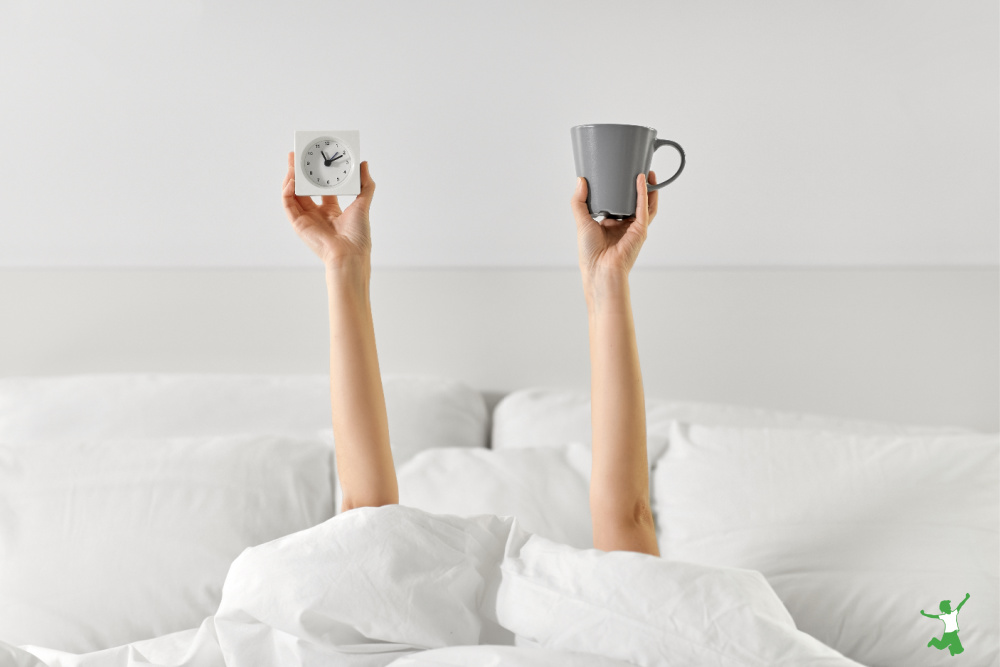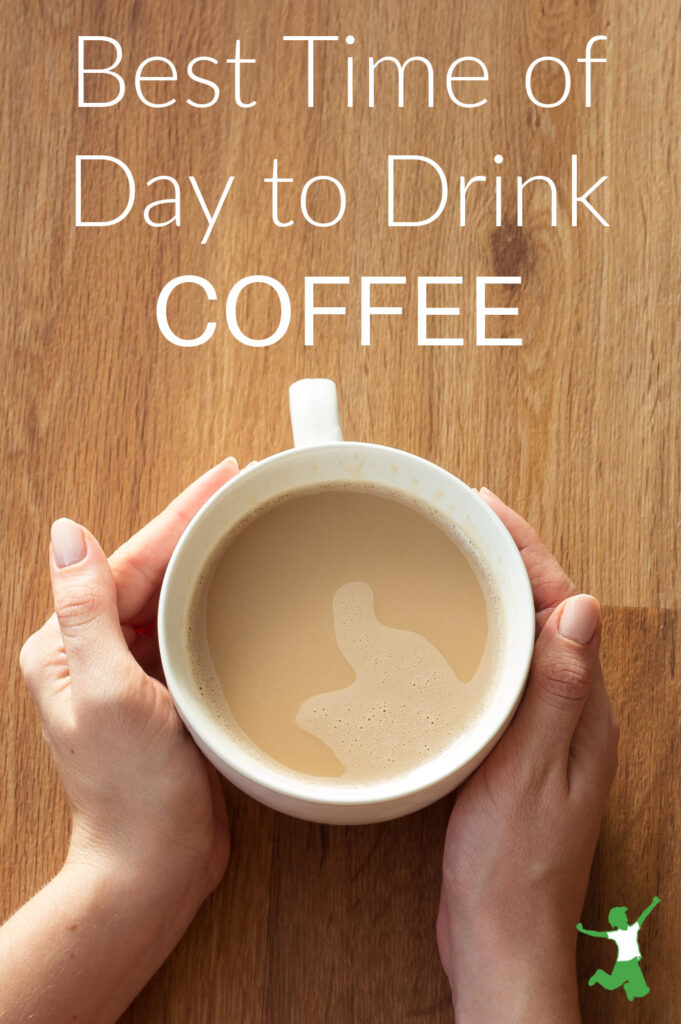Table of Contents[Hide][Show]
The best time in the morning to drink coffee to encourage the production of serotonin and maintain a balanced mood all day long.

I spent the entire first day at the International Wise Traditions Conference one year camped out in the room where Julia Ross was speaking.
Julia Ross is the acclaimed author of the books The Mood Cure and The Diet Cure.
It was my first opportunity to hear her speak, and I was not disappointed.
I took boatloads of notes that day and have enough material for several blog posts which I will write up in the coming weeks.
Today, however, I want to specifically address Julia’s discussion about coffee.
Julia Ross’ take on coffee is different from other speakers I have listened to before.
I wanted to share her warning about it because I think it’s something most coffee drinkers have no idea about.
Julia says that her main objection is that people drink coffee first thing in the morning when they get up. This typically results in skipping breakfast altogether because coffee is a strong appetite suppressant.
Not to mention that coffee reduces (not increases as popularly believed) blood flow to the brain by about 25%.
Worst Time for Coffee is First Thing in the Morning
Skipping breakfast is a big no-no and not just because it increases your chances of overeating especially starches and sugars later in the day.
Skipping your morning meal does a number on your body’s ability to produce the neurotransmitter serotonin which is derived from the amino acid tryptophan.
Tryptophan, like all the amino acids, is contained in protein.
Meat is the best source of tryptophan but only from animals roaming on pasture (corn contains almost NO tryptophan so don’t eat beef from corn fed cattle or eggs from primarily corn/soy fed chickens).
Protein (food) —–> Tryptophan (amino acid) —–> Serotonin (neurotransmitter) —–> Melatonin (hormone for restful sleep)
Serotonin is what helps you feel happy, calm, and self-confident even in the face of stress
. Moreover, ample serotonin is important for a restful night’s sleep as the body converts serotonin into melatonin at dusk. Inadequate melatonin results in insomnia problems.
Skipping breakfast in the morning short circuits the body’s ability to produce adequate serotonin throughout the day.
While eating protein later in the day definitely helps, your body still ends up playing serotonin catch up all day every day due to missing breakfast.
Julia says that we all need about 20-30 grams of protein 3X per day to fulfill our body’s requirement for amino acids in order to produce adequate neurotransmitters like serotonin.
If you are already deficient in serotonin, supplementation may be required for a short time to regain neurological balance.
This topic of neurotransmitters tends to get rather complicated, but the bottom line is this:
If you must drink coffee, then at the very least, wait until after breakfast to do it!
This way, the impact on your serotonin levels will not be as severe as drinking coffee first thing in the morning and skipping breakfast due to the appetite-suppressing effects.
You may find that this one simple change alone will help balance emotions the rest of the day.
Feelings of happiness, emotional flexibility, and stress reduction are common once this simple change is made.
How to Replenish Serotonin
Do you suspect that your serotonin levels are in the tank and you need neurotransmitter supplementation?
Clues would be that you grapple with worry, anxiety, OCD thoughts or actions, depression, panic attacks, and/or chronic insomnia.
In that situation, Julia Ross recommends this dosage with the amino acid tryptophan:
- 5-HTP (suggested source): 50 mg in the mid-afternoon and before bedtime.
OR
- L-tryptophan (suggested source): 500 mg in the mid-afternoon and again before bed especially if insomnia is a problem.
Note that 5-HTP is cheaper than L-tryptophan but some people get nausea from it, so switch to L-tryptophan if 5-HTP doesn’t work for you.
For children, start with a fraction of the dose above and only use L-tryptophan.
Raise the dosage as needed to eliminate low serotonin symptoms.
Next Steps
Once you’ve put off AM coffee until after you eat, you might perhaps feel motivated to try to shake the habit completely.
According to Julia Ross, people who crave chocolate, coffee, alcohol, and even exercise are typically low in the neurotransmitter endorphin.
Using supplementation of amino acids that are precursors to endorphin may help in trying to shake the coffee habit completely. These include:
- Amino acid d-phenylalanine (DPA) (suggested source): 500 mg, 2-4X/day. Use DPA if you are a daily coffee drinker and also an anxious person.
OR
- Amino acid d-phenylalanine (DPA) bound to the amino acid I-phenylalanine (LPA) – known in combination as DLPA (suggested source): 500 mg, 2-3X/day. Use DLPA if you crave the energizing effects of coffee and are not typically an anxious person.
Do you think a deficiency of neurotransmitters might be the reason some folks love their coffee so much?
Are you game to try changing when you drink AM coffee to help balance brain chemistry? Or, does it make more sense to switch to a noncaffeinated beverage like dandelion coffee instead?
Please share your thoughts on this and personal experience in the comments!

More Information
The Truth About Your Morning Coffee Fix
How Bulletproof Coffee Shoots You in the Foot








I agree it IS a suppressing agent. I drink it 1st thing then hours later I realize I haven’t eaten & I’m hungry. I will try to eat 1st then have coffee later. Thanks!
Glad to see this. I’m VERY slowly getting off my habit of 4 cups day. My adrenals are now completely shot and my hormones very low which is leading to more issues. After living on coffee to get me through my day for the last 10 years, I’m now dealing with the consequences. But with everything moderation is key.
Seems the article is more focused on not skipping breakfast. How about those of us that drink coffee every morning WITH breakfast?
She said that you should do it after breakfast so to me it seems she addressed it.
There are plenty of things we eat and drink that can do damage in large amounts. I managed to lose over a hundred pounds, the whole while drinking a large cup if coffee every morning, which I still do. When I was a couch potato and nearly 400 pounds I was not in the habit if drinking coffee every morning. Go figure. If you’re not overdoing it, don’t worry about it. Focus on your overall diet instead.
I don’t really get a rush out of coffee. I just like how it tastes. so I drink it after my morning green smoothie with stevia and a splash of milk. only one cup though or it’s heartburn city man!
Coffee wreaked havoc on me when I got addicted to having it several times a day during college. Now, I have about 4-6 oz most mornings, after I’ve eaten breakfast. I can take it or leave it without too much problem, but I love the taste and aroma. What do you think of teeccino as an alternative?
Does it matter if the coffee is caffienated?
The protein in coffee (yes there is some believe it or not) triggers problems in some people so even caffeine free can be an issue.
For me, it is not the caffeine in coffee that is the problem as I can drink tea on occasion and eat chocolate now and then without a problem. It is the coffee itself that totally destabilizes my body chemistry.
I would say if you are going to drink decaf, make sure it’s a water processed decaf and that your beans are only 100% Arabica (higher altitude, better quality, smaller family farms that don’t use chemicals) and locally roasted. The cheap, low altitude grown coffee (robusta beans) is highly fertilized processed & has 3x the caffeine and to decaf it, they soak it in chemicals like formaldehyde. All that coffee on the grocery shelves is what’s caused so many of the issues that coffee gets blamed for.
I don’t know if I could even make breakfast if I didn’t drink my coffee first. LOL. The other bits about serotonin and fatigue are worth considering a change though.
Aw, Charlotte you beat me to it!
Also, do you have a defined time limit on when to eat breakie?
Before lunch? LOL 🙂